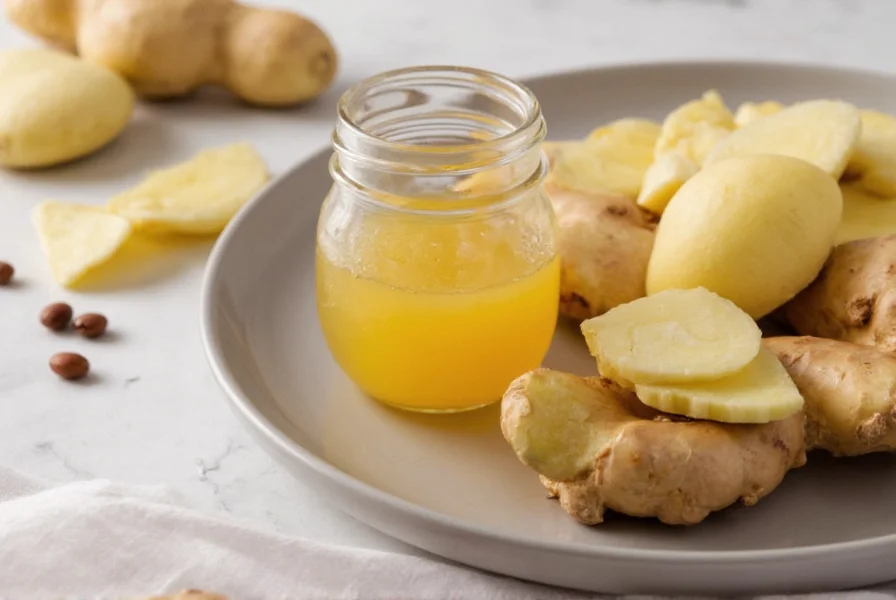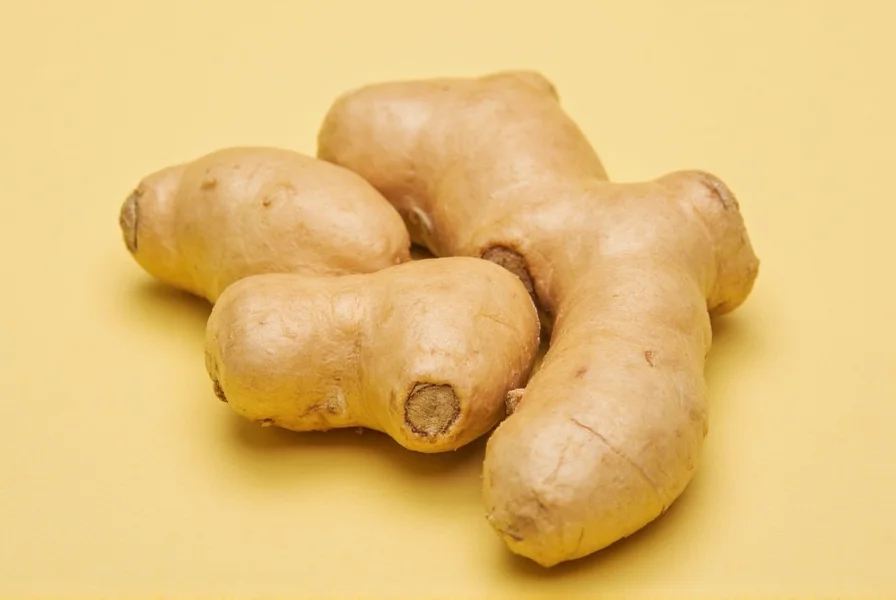For centuries, ginger has been used as a natural remedy for various digestive issues. When it comes to acid reflux—a condition where stomach acid flows back into the esophagus—many people turn to ginger seeking relief. But what does the science actually say about ginger for acid reflux? Let's examine the evidence behind this popular home remedy.
The Science Behind Ginger and Digestive Health
Ginger (Zingiber officinale) contains bioactive compounds like gingerols and shogaols that influence digestive processes. A 2007 study published in Molecular Research and Food Nutrition found that ginger may accelerate gastric emptying, which could potentially reduce the likelihood of acid reflux episodes. When stomach contents move through more efficiently, there's less opportunity for acid to back up into the esophagus.
Another mechanism involves ginger's anti-inflammatory properties. Chronic acid exposure can inflame the esophageal lining, and ginger's compounds may help mitigate this inflammation. Research in the Journal of Gastroenterology and Hepatology suggests ginger might reduce the production of certain inflammatory markers in the digestive tract.
Evidence on Ginger for Acid Reflux: What Studies Show
While traditional use supports ginger for digestive issues, scientific evidence specifically for acid reflux remains limited but promising:
| Study | Findings Related to Acid Reflux | Limitations |
|---|---|---|
| 2011 Review in Food Science and Nutrition | Ginger demonstrated potential to reduce gastric contractions that contribute to reflux | Not specific to GERD patients; primarily animal studies |
| 2019 Study in Complementary Therapies in Medicine | Ginger supplementation reduced heartburn frequency in 60% of participants with mild GERD | Small sample size (n=50); short duration (4 weeks) |
| 2022 Meta-Analysis in Nutrients | Insufficient evidence to recommend ginger as primary treatment, but suggested potential as complementary approach | Only 3 studies met inclusion criteria for GERD analysis |
These studies indicate that while ginger shows promise for mild acid reflux relief, the evidence isn't robust enough to consider it a primary treatment for GERD. Most research focuses on ginger's general digestive benefits rather than its specific effects on acid reflux.
How Ginger Might Help with Acid Reflux Symptoms
Ginger potentially addresses acid reflux through several mechanisms:
- Accelerated gastric emptying - By helping the stomach empty more efficiently, ginger may reduce the volume of stomach contents available to reflux
- Reduced lower esophageal sphincter relaxation - Some evidence suggests ginger might help maintain proper sphincter function
- Anti-inflammatory effects - May soothe irritation in the esophagus caused by acid exposure
- Antioxidant properties - Could protect esophageal tissue from damage
However, it's crucial to understand that ginger's effects vary significantly between individuals. What works for one person's acid reflux natural remedies might not work for another.

Using Ginger for Acid Reflux: Practical Recommendations
If you're considering ginger as part of your acid reflux management strategy, here are evidence-based suggestions:
Forms of Ginger
- Ginger tea - Steep 1-2 inches of fresh ginger in hot water for 10 minutes. This gentle preparation may be less likely to irritate than raw ginger.
- Capsules - Standardized supplements typically contain 250-500mg of ginger extract. Look for products with at least 5% gingerols.
- Candied ginger - A milder option that provides ginger benefits without the intense raw flavor.
- Cooked ginger - Incorporating ginger into meals may provide benefits without the potential irritation of raw consumption.
Dosage Guidelines
Research suggests these safe dosage ranges for digestive support:
- Up to 4 grams of ginger per day is generally considered safe for most adults
- For ginger tea for acid reflux relief, 1-2 cups daily is a common starting point
- Supplements: 250-500mg taken 2-3 times daily with meals
Start with small amounts to assess tolerance. Many people find that 250mg of ginger taken before meals helps prevent reflux episodes.
Potential Risks and Considerations
While ginger offers potential benefits, it's not appropriate for everyone with acid reflux:
- Raw ginger may worsen symptoms - The pungent compounds in raw ginger can irritate the esophagus in some individuals
- Medication interactions - Ginger may interact with blood thinners, diabetes medications, and certain heart medications
- Pregnancy considerations - While generally safe during pregnancy for nausea, consult your doctor before using for reflux
- Timing matters - Consuming ginger too close to bedtime might increase nighttime reflux for some people
A 2020 study in Phytotherapy Research noted that approximately 15% of participants with GERD reported worsened symptoms when using raw ginger. This highlights why personalized approaches are essential when exploring ginger supplements for acid reflux.

Ginger as Part of a Comprehensive Acid Reflux Management Plan
Ginger should be viewed as one potential component of a broader approach to managing acid reflux, not a standalone solution. Effective management typically includes:
- Dietary modifications (reducing trigger foods like caffeine, alcohol, and fatty foods)
- Maintaining a healthy weight
- Elevating the head of your bed
- Avoiding large meals before bedtime
- Stress management techniques
- Medical treatment when necessary
For those with occasional heartburn, ginger might provide complementary support. However, for chronic GERD (occurring more than twice weekly), consult a healthcare provider before relying on natural remedies like ginger alone.
When to Consult a Healthcare Professional
While exploring natural approaches like ginger for heartburn relief, recognize these warning signs that require medical attention:
- Reflux symptoms occurring more than twice weekly
- Difficulty swallowing
- Unintentional weight loss
- Persistent vomiting
- Chest pain (to rule out cardiac issues)
- Symptoms that don't improve with over-the-counter treatments
Chronic acid reflux can lead to complications like esophagitis, Barrett's esophagus, or even esophageal cancer if left untreated. Never delay professional medical evaluation for persistent symptoms.
Conclusion: Ginger's Role in Acid Reflux Management
The relationship between ginger and acid reflux shows promise but requires careful consideration. Current evidence suggests ginger may help some individuals with mild, occasional reflux as part of a comprehensive management approach. However, it's not a cure-all, and for some people, it might worsen symptoms.
When exploring scientific evidence on ginger and GERD, remember that individual responses vary significantly. Start with small amounts of prepared ginger (like tea) rather than raw ginger, monitor your symptoms carefully, and consult with a healthcare provider—especially if you have chronic reflux or take medications.
Natural remedies like ginger can complement conventional treatments, but they shouldn't replace medical care when needed. The most effective approach to managing acid reflux combines evidence-based lifestyle modifications, appropriate medical treatment when necessary, and potentially helpful natural approaches like ginger—all tailored to your individual needs and responses.
Frequently Asked Questions
Does ginger actually help with acid reflux?
Research suggests ginger may help some people with mild acid reflux by improving gastric motility and reducing inflammation. A 2019 study found ginger supplementation reduced heartburn frequency in 60% of participants with mild GERD. However, evidence remains limited, and ginger might worsen symptoms for others, particularly when consumed raw. It should complement—not replace—medical treatment for chronic acid reflux.
What's the best way to take ginger for acid reflux?
Ginger tea is generally the most gentle option for acid reflux relief. Steep 1-2 inches of fresh ginger in hot water for 10 minutes and drink 20-30 minutes before meals. Start with one cup daily and monitor your response. Avoid raw ginger, which can irritate the esophagus in some people. Ginger supplements (250-500mg) taken with meals may also help, but consult your doctor first if you take medications.
Can ginger make acid reflux worse?
Yes, ginger can worsen acid reflux symptoms for some individuals. Approximately 15% of people with GERD report increased symptoms when using raw ginger, according to a 2020 study. The pungent compounds in ginger may irritate the esophagus lining in sensitive individuals. If you experience burning or increased reflux after consuming ginger, discontinue use. Those with erosive esophagitis may be particularly susceptible to ginger-induced irritation.
How long does it take for ginger to work for acid reflux?
When ginger helps with acid reflux, effects are typically noticed within 30-60 minutes when taken before meals. However, consistent use over 2-4 weeks may be needed to observe significant improvements in symptom frequency. A 2019 clinical trial showed reduced heartburn frequency after four weeks of daily ginger supplementation. Individual responses vary considerably, so track your symptoms to determine if ginger provides benefit for your specific case of acid reflux.
Can I take ginger with my acid reflux medication?
Ginger may interact with certain acid reflux medications and other drugs. It can potentially enhance the effects of blood thinners like warfarin and may interact with diabetes medications and certain heart drugs. While ginger generally doesn't interfere with common acid reducers like PPIs (proton pump inhibitors) or H2 blockers, consult your healthcare provider before combining ginger with any medication. They can assess potential interactions based on your specific medication regimen and health status.











 浙公网安备
33010002000092号
浙公网安备
33010002000092号 浙B2-20120091-4
浙B2-20120091-4